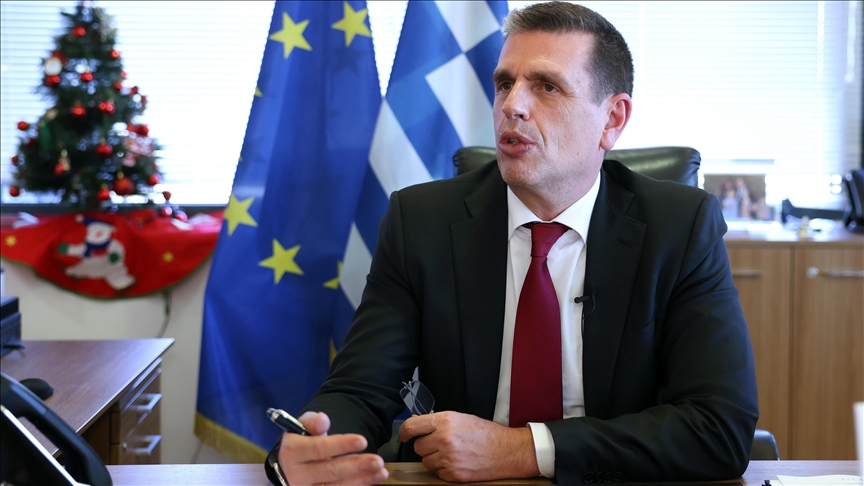

By Anadolu Agency
ATHENS
Greece hopes that the visa facilitation scheme announced by Prime Minister Kyriakos Mitsotakis on Dec. 7 during a joint statement with visiting Turkish President Recep Tayyip Erdogan would contribute to the improvement of the intersocietal ties.
In an exclusive interview with Anadolu, Greek Migration and Asylum Minister Dimitris Kairidis, in reference to the visit, said: “It was undoubtedly a very good day for Turkish-Greek relations after a long time. And I think we can be much more optimistic today than we were before. Everything went very well. Better even than expected.”
Pointing out the role of the politicians in managing the bilateral relations, the minister asserted: “We, politicians from both the Turkish and Greek sides, want to solve problems, not to perpetuate, or increase them.”
More specifically, Kairidis noted that the meeting between Mitsotakis and Erdogan, strong leaders with a refreshed mandate in recent elections, is a profound opportunity not to be missed when it comes to further improving the relations between the NATO allies.
“Now that elections are far away in both countries, 2027 for Greece and 2028 for Türkiye, there is time to make substantial progress. I think we owe it to our people and future generations,” he said.
Visa facilitation scheme for Turkish citizens
According to Kairidis, the visa facilitation scheme, for which he personally strived, should be understood in the scope of the ongoing good spirit in bilateral relations.
He maintained that the scheme came despite strong skepticism from some members of the EU, more peculiarly in Northern and Western Europe.
Reminding that Türkiye is the only candidate member of the EU that doesn’t benefit from the visa-free access to the Schengen Area, unlike other candidate members, Kairidis asserted that Greece has systematically supported Türkiye’s EU prospects and visa liberalization for Turkish citizens.
That state of affairs has also been a problem for Greece, which wanted to attract more Turkish visitors, the minister noted, adding that Turkish tourists are valued by the Greek tourism sector as good spenders and family-oriented people.
“We eventually managed to convince the European Commission about the benefits of the scheme in bringing the Turks and Greeks together,” he said.
As such, Kairidis added: “This is truly a win-win solution for both countries.”
How will visa facilitation program work?
Kairidis explained that the program will permit Turkish citizens, throughout the year, to visit 10 Greek islands – including Lemnos, Lesvos, Chios, Samos, Leros, Kalymnos, Kos, Rhodes, Kastelorizo – for up to seven days by having their special type of visa issued by the Greek police upon their arrival, after their data is checked on the Schengen visa and Europol databases, instead of going through a cumbersome regular visa application process.
Furthermore, he stressed that if this pilot program is successful, arguments for wider visa facilitations for Turkish passport holders will be strong at the level of the European Commission.
Importance of Turkish-Greek rapprochement for region
Drawing attention to the ongoing tensions and conflicts in the wider region, including but not limited to the Israeli-Palestine conflict and the war in Ukraine, Kairidis said: “The last thing the Balkans and the Eastern Mediterranean need is a conflict between Greece and Türkiye, which are two very important countries.”
“It is in the interest of everybody, not only Greeks and Turks but our neighborhood in general, to do our best to overcome difficulties,” the minister added.
Reaffirming the presence of disputes between the countries, Kairidis asserted that the Mitsotakis government is sincere in developing a peaceful co-existence with Türkiye.
We use cookies on our website to give you a better experience, improve performance, and for analytics. For more information, please see our Cookie Policy By clicking “Accept” you agree to our use of cookies.
Read More